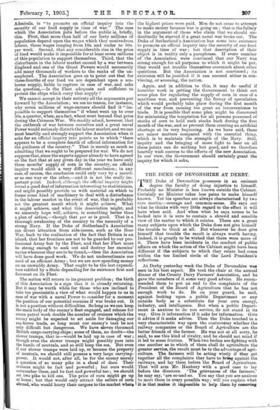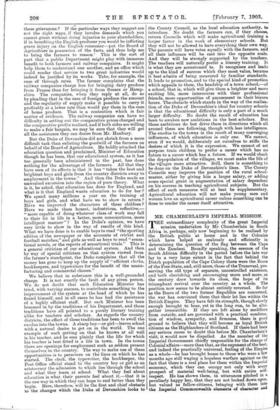THE DUKE OF DEVONSHIRE AT DERBY.
rfIllE Duke of Devonshire possesses in an eminent _L degree the faculty of doing injustice to himself. Probably no Minister is less known outside the Cabinet. Certainly no Minister takes less pains to make himself known. Yet his speeches are always characterised by two rare merits,—courage and common-sense. He says out what he thinks with very little regard to the effect it will have when said. And when what he says comes to be looked into it is sure to contain a shrewd and sensible view of the matter to which it relates. There are a great many subjects upon which the Duke does not give himself the trouble to think at all. But whenever he does give himself that trouble the result is always worth having. Indeed, it is greatly to be wished. that there were more of it. There have been incidents in the conduct of public affairs on which the action of the Cabinet might have been different if the subjects to which they relate had come within the too limited circle of the Lord President's reflections.
At Derby yesterday week the Duke of Devonshire was seen in his best aspect. He took the chair at the annual dinner of the County Dairy Farmers' Association, and. he gave the members of it some very good advice. He recom- mended. them to put an end to the complaints of the President of the Board of Agriculture that he has not enough work to do. Be on your guard, he said, against looking upon a public Department or any outside body as a substitute for your own energy, industry, and intelligence. But when a public Depart- ment is anxious to do you service, do not stand in its way. Give it information if it asks for information. Give it advice if it seeks advice. Then the Duke touched in a very characteristic way upon the controversy whether the railway companies or the Board. of Agriculture are the better friends of the farmer. He was not at all sorry, he said, to see this kind of rivalry, and he should. not mind if it led to some friction. When two bodies are fighting with one another as to which of them shall do agriculture the greater service, the result must be to the advantage of agri- culture. The farmers will be acting wisely if they get together all the complaints they have to bring against the railways, and. lay them before the Board of Agriculture. That will arm Mr. Hanbury with a good case to lay before the directors. The grievances of the farmers,' he may say, 'are so-and-so. You say that you are anxious to meet them in every possible way; will you explain what it is that makes it impossible to help them by removing these grievances ? If the particular ways they suggest are not the right ways, if they involve demands which you cannot grant without doing injustice to your shareholders, if in benefiting the English producer you would be inflicting grave injury on the 'English consumer—put the Board of Agriculture in possession of the facts, and thus help me to bring the farmers to reason.' This is the sort of part that a public Department might play with immense benefit to both farmers and railway companies. It might help them to understand one another, and an office which could render that service to two great industries would indeed be justified by its works. Take, for example, the case of through rates. The farmer complains that the railway companies charge less for bringing dairy produce from France than for bringing it from Sussex or Hamp- shire. The companies, when they reply at all, do so by pleading that in the case of foreign produce the amount and the regularity of supply make it possible to carry it profitably at a lower rate than would pay them in the case of home produce. That is a contention which is fair matter of evidence. The railway companies can have no difficulty in setting out the comparative prices charged and the comparative profits realised, and if both sides are willing to make a fair bargain, we may be sure that they will get all the assistance they can desire from Mr. Hanbury.
But the Duke of Devonshire did not shrink from a more difficult task than enlisting the goodwill of the farmers on behalf of the Board of Agriculture. He boldly attacked the education question and proclaimed, Minister of Education though he has been, that our educational system, as it has too generally been administered in the past, has done nothing for the advantage of the farmers. All that they have seen of its effects is that it has "taken the best and brightest boys and girls from the country districts away to employment in the towns." And then the Duke made an unwonted excursion into the region of pure theory. What is it, he asked, that education has done for England, and what is it that England wants education to do for her ? We spend many millions a year on the training of boys and girls, and what have we to show in return ? Have we improved the characters of these children ? Have we made them honest, industrious, reflective,— " more capable of doing whatever class of work may fall to their lot in life in a better, more conscientious, more intelligent manner " ? In the Duke's opinion, we have very little to show in the way of results of this kind. What we have done is to enable boys to read "the sporting edition of the newspaper or the accounts of cricket and football matches," and girls as well as boys to read "sensa- tional novels, or the reports of sensational trials." This is a general criticism of our educational system. And then by way of special criticism on that system viewed from the farmer's standpoint, the Duke complains that all the money has gone to keep up the supply of "efficient clerks, bookkeepers, and typewriters for the benefit of the manu- facturing and commercial classes."
We believe that in substance this is a well-grounded charge. It is not exactly the fault of any given person. We do not doubt that each Education Minister has tried, with varying success, to contribute something to. the improvement of the system at the head of which he has found himself, and in all eases he has had the assistance of a highly efficient staff. But each Minister has been hemmed in by the traditions of his Department, and those traditions have all pointed to a purely literary training alike for teachers and scholars. As regards the country districts, the effect of these traditions has been to swell the exodus into the towns. A sharp boy—or girl—leaves school with a natural desire to get on in the world. The one example of such getting on that he knows at all well is his teacher, and he sees plainly that the life for which his teacher is best fitted is a life in town. In the towns there are openings for employment such as seldom present themselves in the country. The way to make use of these opportunities is to persevere on the lines on which he has started. The clerk, the typewriter, the bookkeeper, the Post Office official stand to the country boy or girl as an aristocracy the admission to which lies through the school and what they learn at school. What they feel about education is what their parents feel about it,—that it is the one way in which they can hope to end better than they begin. Here, therefore, will be the first and chief obstacle to the changes which the Duke of Devonshire looks to the County Council, as the local education authority, to introduce. No doubt the farmers can, if they choose, return Councils which will make agricultural training a larger factor in the work of elementary schools. But they will not be allowed to have everything their own way. The parents will have votes equally with the farmers, and all their influence will be cast into the opposite scale. And they will be strongly supported by the teachers. The teachers will naturally prefer a literary training. It is what they are accustomed to. It recognises and leads up to the kind of success which they most value, because it best admits of being measured by familiar standards. It leads to promotion, and to the special kind of promotion which appeals to them, the headship of a town school,—of a school, that is, which will give them a brighter and more exciting life, more intercourse with their professional friends, more opportunities of amusement in their leisure hours. The obstacle which stands in the way of the realisa- tion of the Duke of Devonshire's ideal for country schools is that the educational difficulty is only, a part of a much larger difficulty. No doubt the result of education has been to awaken new ambitions in the best scholars. But these ambitions do but drive them in directions which all around them are following, though with less intelligence. The exodus to the towns is the result of many converging influences, of which education is only one. We cannot, even if we would, deliberately set ourselves to stifle the desires of which it is the expression. We cannot of set purpose train children to prefer a career which has no future to a career which has a future. If we would check the depopulation of the villages, we must make the life of the villages more attractive. Still, there is something to be done on the Duke of Devonshire's lines. The County Councils may improve the position of the rural school- master, either by giving him a larger salary, or adding some special grant in augmentation of salary dependent on his success in teaching agricultural subjects. But the effect of such measures will at best be supplementary. Agricultural education will not make young men and women love an agricultural career unless something can be done to render the career itself attractive.











































 Previous page
Previous page